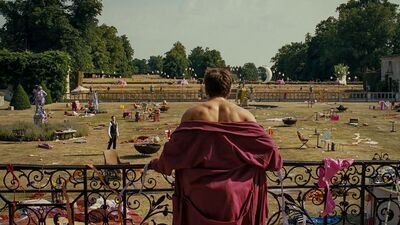In “Saltburn,” that false stability can be seen in the very appearance of the family’s country home. With its strong oak interiors, its sturdy stone exteriors, and the vastness of its grounds, Saltburn is a monument to the stasis of Felix’s wealth. You would think Fennell would better connect the symbolism of the home—particularly through servant class—with Oliver’s carnal and monetary pursuits. But the symbolism lacks definition.

Worst yet, “Saltburn” has a glaring disinterest in the psychological. By comparison, “Chameleon Street” is obsessed with Street’s multiple personalities, his self-diagnosing and self-loathing. Vincent in “Gattaca” is defined by his rivalry with his genetically “superior” brother Anton (Loren Dean). Tom’s self-hatred of his class and queerness in “The Talented Mr. Ripley” permanently fractures his sexual identity. Even Joseph Losey’s “The Go-Between,” which Fennell has noted as a major influence on “Saltburn” has greater psychological tension. In Losey’s adaptation of L. P. Hartley’s same-titled novel, Leo Colston (Dominic Guard), a young boy, arrives at a Norfolk country house for the summer only to become the proverbial middle man in a burning relationship between Marian Maudsley (Julie Christie) and tenant farmer Ted Burgess (Alan Bates). Throughout “The Go-Between,” Losey pushes forward a few decades to an adult Leo, now grappling with the trauma, desire, and loss of innocence during that summer. These films desperately want viewers to understand, even empathize with the striver’s desire for acceptance and the cost they must bear to find it.
Fennell lacks a similar interest in Oliver. He exists purely as a carnal character. In that respect, “Saltburn” most closely aligns to René Clément’s adaptation of “The Talented Mr. Ripley,” “Purple Noon,” wherein Tom Ripley (Alain Delon) is an apathetic soul searching to satiate his appetite for lust and greed. In “Purple Noon,” Clément isn’t out for biting class satire; but for postcard views of Italy matched to Delon’s breathtaking beauty. If that was all Fennell wanted out of “Saltburn,” such a result would be doable. Even commendable. After all, this is a prodigious step forward in her visual language from “Promising Young Woman,” a film similarly concerned with masks. And yet, you can’t help but feel like Fennell is aiming for something more than arrestingly shot teenage thriller territory.
It’s telling that Fennell doesn’t interrogate the rich solely through Oliver Quick. Farleigh is there too, occupying several different worlds. He isn’t independently wealthy (Farleigh and his mom require a monthly allowance from Felix’s father). He isn’t quite part of the family either; he’s merely a cousin. He is both American and British, and racially ambiguous. Similar to Oliver, Farleigh despises a class that is just out of reach. When Farleigh goes to Felix, asking to give his mother more money, the conversation turns to race. “I mean, you do know how this looks, right? Making me come to you with a begging bowl,” says a perturbed Farleigh. A vacant Felix is confused, then riled. “Is that where you want to take this? Make this a race thing,” he responds. The camera remains fixed on the vexed Farleigh, only partially listening to Felix’s fragile “We’re your family. We hardly even notice you’re different,” defense. The scene makes you wonder how much different the movie could be, from a passing standpoint, if Madekwe were playing Oliver Quick. Beyond this scene, Fennel’s intertwining of race and class as a similar stasis of being is nonexistent. What is the internal psychological angst of Farleigh? What does it mean to be between worlds, not in a tragic sense, but precariously?

